The Best Cloudflare Alternatives (2024 Comparison)

Welcome to our roundup of the best Cloudflare alternatives.
Cloudflare is one of the most popular CDNs (content delivery networks) out there, but it isn’t the only option.
There are lots of other providers out there that you can use to boost your website performance and security instead. And in this post, we’ll be revealing our favorites.
Below, you’ll find everything you need to know about all the best Cloudflare alternatives available this year, including their pros and cons, key features, pricing, and more.
The best Cloudflare alternatives – comparison
TL;DR:
NitroPack is the best Cloudflare alternative for website owners that want to speed up their website without getting wrapped up in technical issues. In a few clicks, it will deploy a CDN, optimize and convert images to next-gen formats, and run other optimizations to speed up your site.
Sucuri offers an integrated CDN and WAF (web application firewall). Plus, it provides website monitoring for important stuff like malware as well. Malware removal is included.
#1 – NitroPack
NitroPack is the best Cloudflare alternative for content creators, entrepreneurs, and publishers. It’s an all-in-one site speed and performance optimization solution that includes much more than a CDN.
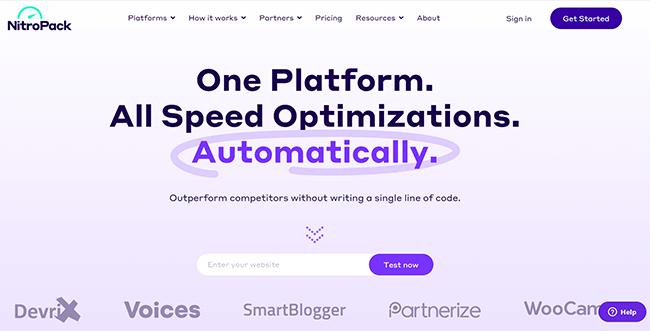
Like Cloudflare, NitroPack operates a global CDN with tons of data centers distributed all across the world, which serve your website resources to the end-user more quickly for faster page load times.
But that’s only the tip of the iceberg. It also comes with a raft of other performance-boosting features that you won’t find in Cloudflare’s free plan, including best-in-class caching, CSS and HTML minification, image optimization, JS optimization, lazy loading, and much more.
And the best part is, it deploys all those optimizations automatically. So compared to Cloudflare, it’s a breeze to set everything up.
You don’t need any tech skills and you won’t have to write a single line of code—just install the plugin and run through a super-quick setup process. And within 5 minutes, it’ll start rolling out tons of optimizations that should dramatically increase your website performance.
We tested it out for ourselves on a test site and saw a huge jump in speed pretty much straight away. With NitroPack, document load time instantly went from 2.37 seconds to just 0.9 seconds. And Time to First Byte (TTFB) was cut in half, dropping from 0.35 seconds to 0.17 seconds.
Key features
- CDN
- Caching
- CSS optimization
- HTML optimization
- Javascript optimization
- Image optimization
- Integrations with WordPress, WooCommerce, Magento, and Opencart
Pros
- All-in-one performance solution
- Includes image and code optimizations
- Applies all optimizations automatically
- Easy to use (5-minute setup)
Cons
- The free plan is only suitable for low-traffic sites (maximum 5,000 pageviews and 1GB of bandwidth)
- Lacks some security features (no firewall)
Pricing
Free plan available. Paid plans start at $21/month, sign up yearly to get 2 months free. There’s no free trial but there is a 14-day money-back guarantee.
Read our NitroPack review.
#2 – Sucuri
Sucuri is a complete website security platform that includes an integrated CDN and WAF. You can use it to monitor, clean, and protect your site from malware and other security risks.
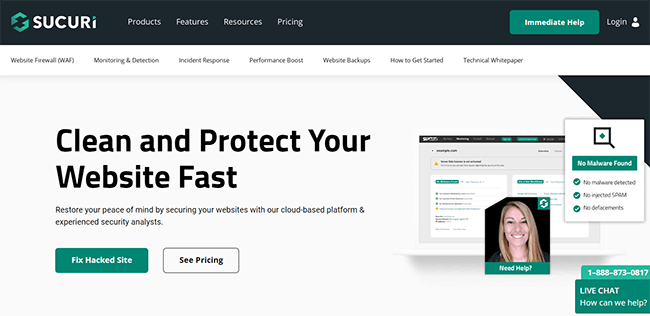
The main difference between Cloudflare and Sucuri is that Cloudflare specializes in boosting website performance, whereas Sucuri is all about website security.
It comes with a powerful cloud-based firewall that helps to protect your site from malicious attacks.
Plus, the built-in malware scanner is constantly monitoring your site for security vulnerabilities. And if malware does manage to slip through the net, Sucuri can help you to remove it.
Other features include blocklist monitoring and removal, automatic website backups, DDoS mitigation, load balancing, and more.
Aside from the security stuff, Sucuri also includes a CDN that’s capable of boosting speeds by as much as 70%. Its network of edge servers isn’t quite as large as Cloudflare’s, but it’s still distributed across all the most important areas for website traffic.
Key features
- Unlimited manual malware/hack cleanups
- Post-cleanup reports
- Advanced security scans
- Website Application Firewall (WAF)
- CDN speed enhancement
- Blocklist monitoring and removal
- SSL support and monitoring
- Virtual patching and hardening
- Advanced DDoS mitigation
- High availability/load balancing
Pros
- Best-in-class security features
- Advanced protection
- Complete website monitoring solution (uptime monitoring, spam database monitoring, etc.)
- Malware scanning and removal
- Compatible with all CMS and web hosting services
- Optional website backups (from $5/m)
Cons
- Website Security Platform Plans are expensive
- Fewer edge servers than Cloudflare
Pricing
Plans start from $9.99/month. There’s no free plan or free trial but they offer a 30-day guarantee.
#3 – Bunny.net
Bunny.net is a global content delivery network that offers a next-gen CDN and edge storage, as well as a raft of website optimization and security features.
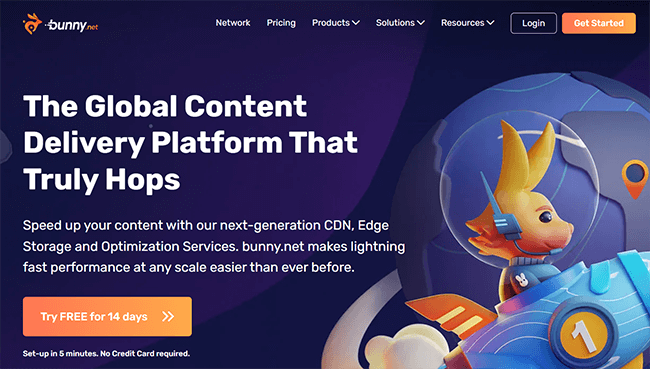
What makes Bunny.net stand out is its performance. While it has fewer data centers than Sucuri (114 to 270+), it nonetheless provides lower average global latency (26ms compared to 28ms)
And even with its enterprise-grade performance, it’s still available for a fraction of the cost of Sucuri’s paid plans, making it superb value for money.
It’s also very easy to deploy. With Bunny Optimizer, you can accelerate your website performance with a single click. It also offers DNS, image processing, DDoS protection, perma-cache, video delivery, and much more.
Key features
- CDN
- Storage
- Optimization
- Video streaming
- DNS
- DDoS protection
- Perma-caching
- Free SSL certificate
- Real-time monitoring
Pros
- Broad feature set
- Easy to set up
- Enterprise-grade performance
- Good value for money
Cons
- Fewer PoPs than Sucuri
- No monthly CDN subscription plan (pay-as-you-go pricing)
Pricing
Pay-as-you-go CDN pricing starts from $0.01/GB, with a $1 monthly minimum. A 14-day free trial is available.
#4 – KeyCDN
KeyCDN is a dedicated, high-performance content delivery network and another one of Cloudflare’s biggest competitors.
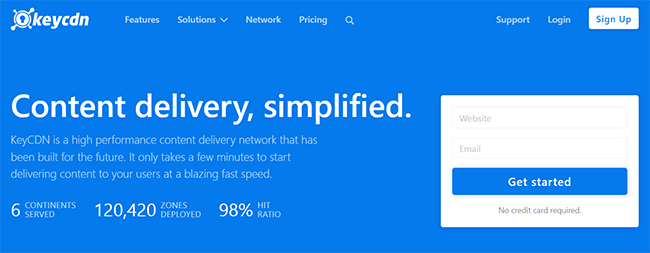
KeyCDN’s edge servers are distributed across 6 continents, and each one has been optimized for maximum performance with an advanced TCP stack, 100% SSD coverage, and latency-based routing technology.
Aside from the CDN, it also comes with image optimization (image resizing, compression, etc.) and security features (DDoS protection, SSL support, access rules, OCSP stapling, TLS encryption, etc).
What’s great about KeyCDN is that it’s super developer-friendly thanks to the RESTful API, robust documentation, detailed reports, and flexible configuration.
In fact, the whole platform has been designed to be as easy as possible to configure to meet pretty much any specification. There’s also native integration with all the leading CMS platforms, like WordPress, Magento, Joomla!, and Drupal.
Key features
- CDN
- Image optimization
- DDoS protection
- Custom SSL certificates
- RESTful API
- CMS integration
Pros
- High-performance CDN
- Advanced image optimization and security features
- Developer-friendly
Cons
- No free option
- Geared more towards developers (setup requires some tech skills)
Pricing
Pay-as-you-go pricing from $0.04/GB to $0.01/GB depending on volume. $4 monthly minimum. No free plan or free trial is available.
#5 – Amazon CloudFront
Amazon CloudFront is Amazon’s low-latency content delivery network. It’s a good alternative for enterprise users who want maximum performance, security, and developer convenience.
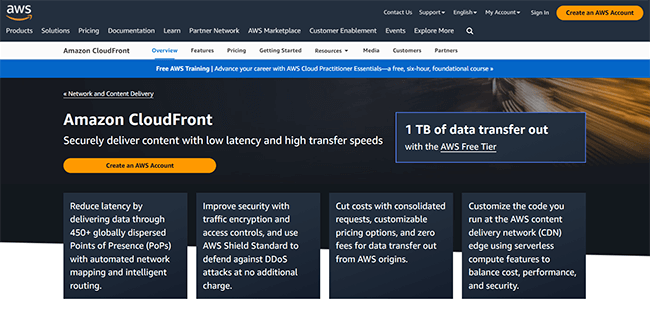
Amazon Cloudfront has 450+ globally-distributed PoPs, which is about as good as it gets. That’s more than any other CDN provider we’ve tried, including Cloudflare.
Built-in data compression, edge compute capabilities, field-level encryption, automated network mapping, and intelligent routing are just some of the features that take Cloudflare to the next level.
Aside from allowing you to deliver content to visitors around the globe faster and more efficiently, CloudFront can also improve your site security through traffic encryption, access controls, and the included AWS Shield Standard DDoS protection.
All that said, keep in mind that Cloudfront has been built with developers in mind, so the initial setup/configuration is highly complex. As such, it’s probably not the best choice for independent bloggers and entrepreneurs who don’t have a website development team behind them. But for those who do, there’s no better option.
Key features
- Global edge network
- AWS Shield
- AWS Web Application Firewall (WAF)
- SSL/TLS encryption
- Access control
- Origin Shield
- Real-time metrics
- Logging
Pros
- Enterprise-level performance
- Developer-friendly
- Advanced feature set
- Huge network (450 PoPs)
Cons
- Not suitable for non-developers (highly complex configuration)
- High pay-as-you-go starting price compared to some other providers
Pricing
Free tier available. Pay-as-you-go pricing starts from $0.085 depending on usage and region.
#6 – Azure
Azure is a cloud computing platform from Microsoft. Their services include a powerful, flexible, and scalable content delivery network.
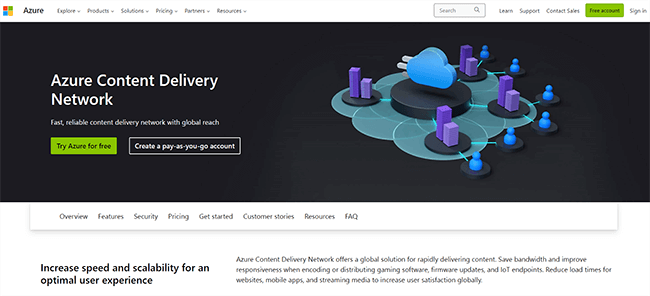
Microsoft Azure CDN works like any other CDN, enabling you to deliver website content like audio, video, apps, photos, and other files to your customers more quickly and efficiently by serving it from a server as close as possible to each user.
There are over 118 PoPs around the world, covering many of the world’s major cities, ensuring lightning-fast content delivery.
Not only that, but Azure CDN can also help to save bandwidth, improve responsiveness, and protect your site.
And it helps with scalability too. The CDN can respond to traffic fluctuations so that if your website suddenly gets a sudden traffic spike and experiences heavy loads, it can handle it.
Like Amazon CloudFront, Azure CDN is very developer-friendly, with a unified API, flexible configuration, and all the tools developers need to build and automate global applications.
Key features
- CDN
- Unified API
- Developer tools
- Security features
- Optimization features
Pros
- Developer-friendly
- Large network
- Excellent performance
- Scalable
- Flexible configuration
Cons
- Complex configuration/setup
- Confusing pricing
Pricing
Pay-as-you-go pricing starts at $0.08/GB for your first 10TB/month, with heavy discounts applied based on additional usage. Free 30-day trial available.
#7 – Akamai
Last but not least, we have Akamai—another distributed edge and cloud platform that offers CDN services, web security services, and more.
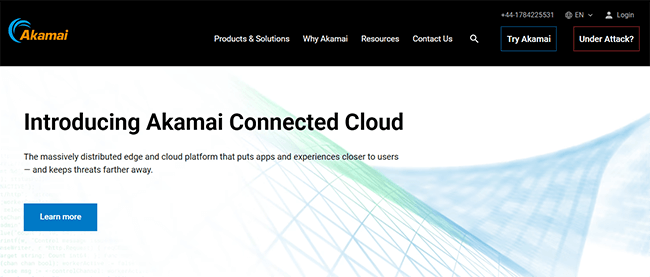
Akamai claims to be ‘the world’s largest network edge platform and content delivery network’, and they do indeed have a lot of pins on the map. Their network of edge servers stretches right across the world, covering all the most densely-populated areas and 130+ countries.
Global traffic management helps to minimize outages and optimize your website or app performance through intelligent load balancing. Meanwhile, the image and video manager automatically optimizes the visual media on your site to further enhance loading speeds.
And again, Akamai is very developer-friendly, with API acceleration, CloudTest for real-time load testing, DataStream log data, etc.
Key features
- CDN
- API acceleration
- Media delivery
- Cloud computing
- Security
- Load testing
- Global traffic management
- Log data
- mPulse
- Ion
- Image and video manager
Pros
- Large network
- Strategically distributed servers
- Developer-friendly features
- Good performance
Cons
- Complex configuration/setup
Pricing
You’ll need to contact Akamai for a quote based on your needs. A free trial of the API Acceleration solution is available.
Cloudflare alternatives FAQ
Before we wrap up, here are the answers to some FAQs about Cloudflare.
What is Cloudflare?
Cloudflare is a web performance and security company that provides a range of services to help website owners and developers to protect their sites and web apps from malicious attacks, reduce server load, and boost their loading speeds.
They also provide domain name registration, DNS resolution, network analytics, serverless code deployment, and more.
How does Cloudflare work?
Cloudflare works by operating a huge network of servers/data centers that are distributed all across the world. This is known as a CDN (content delivery network).
Content from your site is cached and served to your web traffic from whatever server in Cloudflare’s CDN is closest to the end user geographically, allowing information to be transferred more quickly.
This helps pages to load faster and provides an additional layer of defense to help protect and defend you from malicious traffic.
There’s a little more to it than that, but that’s the gist of it. You can learn more about what a CDN is and how it works here.
Is Cloudflare free?
Cloudflare offers a free plan that comes with the core features like CDN, static content caching, etc. However, if you want to unlock premium features like image resizing/optimization, DDoS alerts, cache analytics, etc. you may need to upgrade to a paid plan or purchase an add-on.
Do I need a CDN?
Most websites could benefit from using a CDN. It can provide significant performance, speed, and security enhancements to your website. This, in turn, can have a positive impact on both user experience and your search ranking positions.
Related: How Does Page Speed Impact SEO? And Why Should You Care?
Why shouldn’t you use Cloudflare?
There are many reasons you might decide not to use Cloudflare.
For example, you might be dissatisfied with your pageload speeds after Cloudflare deployment, or you might be concerned about data protection.
You might also want access to additional security and performance features that you don’t get with Cloudflare’s free plan, but that you do get with some alternatives, like image optimization.
Or you might just be put off by how technical Cloudflare is and prefer a solution that’s easier to deploy for those who aren’t developers.
Is Cloudflare owned by Google?
Cloudflare isn’t owned by Google. However, it was named a Google Cloud Platform technology partner in 2015.
Choosing the best Cloudflare alternative
That concludes our comparison of the best Cloudflare alternatives. We hope you found it useful.
In case you’re still not sure which one to choose, here’s a recap of our top suggestions (you can’t go wrong with either of them):
- NitroPack is the overall best Cloudflare alternative for most website owners. You can use it to instantly optimize your whole site and deploy a CDN in a few clicks.
- Sucuri is another great option, particularly if security is your top priority. It comes with a CDN, WAF, and advanced malware protection and removal features.
If you still haven’t found what you’re looking for, check out the posts below for more tools that can help you to boost your site speed and security:
- 6 Best CDN Services (Comparison)
- 10 Best Plugins To Speed Up WordPress
- 8 Best WordPress Security Plugins And Tools
Disclosure: Our content is reader-supported. If you click on certain links we may make a commission.
